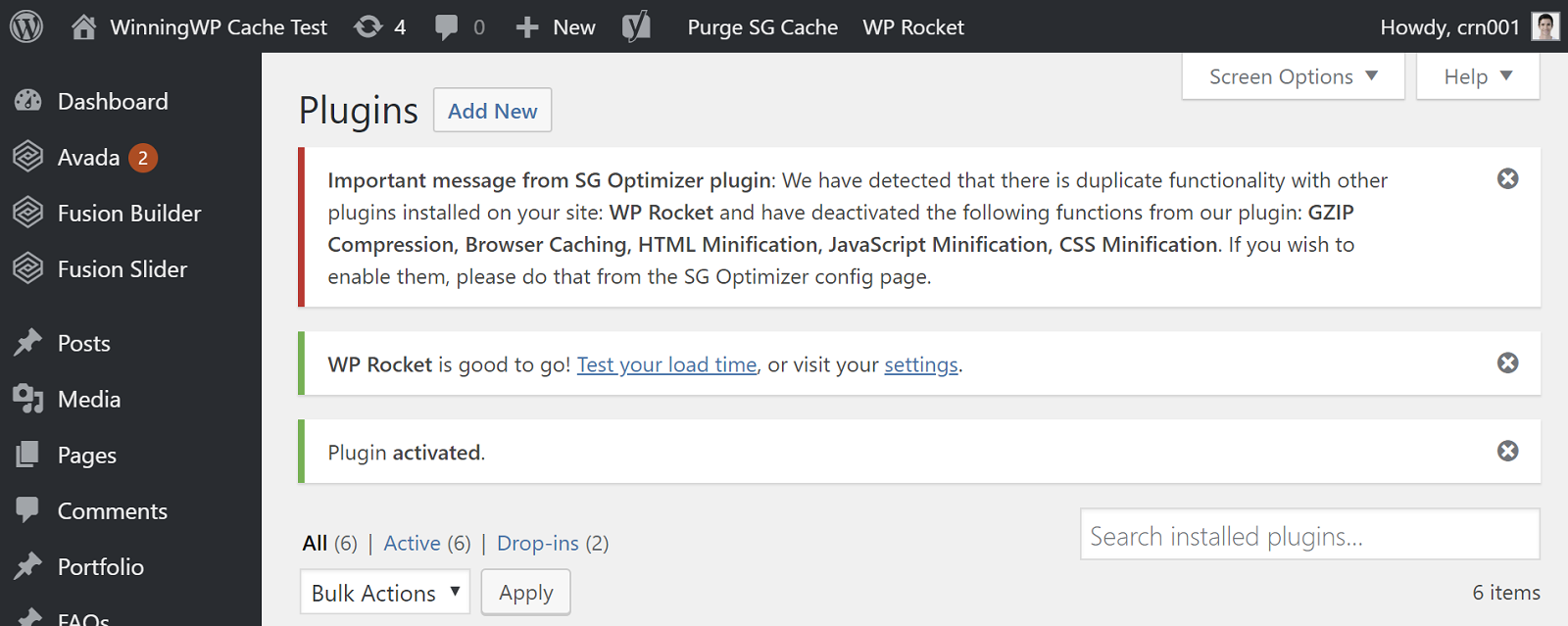- By
If you’re hosting your WordPress site at SiteGround, SiteGround gives you multiple ways to optimize your site for performance. First, you get built-in caching via SiteGround’s SuperCacher. Then, SiteGround also offers a companion SG Optimizer plugin to make other performance tweaks.
So if you’re already using those tools, do you need to do anything else to optimize your site? More specifically, does it still make sense to use a comprehensive WordPress performance plugin like WP Rocket?
In this post, I’m going to try to answer that question with real data. First, I’ll explain exactly what’s happening with SiteGround’s optimization, as well as how WP Rocket fits in. Then, I’ll run a bunch of performance tests to try and figure out if WP Rocket makes a difference.
What’s the Difference Between WP Rocket and SiteGround’s SuperCacher?
On SiteGround’s GrowBig and GoGeek plans, SiteGround includes its own SuperCacher caching solution, as well as a free SG Optimizer companion plugin, which is listed at WordPress.org.
Before I get to the testing, let’s compare the difference between what the SuperCacher functionality and SG Optimizer do versus what WP Rocket does.
SiteGround SuperCacher and SG Optimizer Explained
SiteGround’s SuperCacher adds three levels of caching:
- Static Cache – stores your static files – images, CSS, JS, etc. – in your server’s RAM, which lets your server serve them up from RAM instead of your hard drive.
- Dynamic Cache – this offers full-page caching powered by Nginx and is equivalent to what most WordPress page caching plugins do (including WP Rocket, though the exact mechanism is different). It takes the end-product of WordPress’ PHP and stores it as a static HTML.
- Memcached – this is object caching. It lets you store database queries in the cache so that you can deliver data from the cache, rather than querying your database each time.
In addition to the SuperCacher, SiteGround also has its own free SG Optimizer plugin that comes installed by default with all new WordPress installs at SiteGround. This plugin integrates with the SuperCacher functionality to let you control your cache settings from your WordPress dashboard, and it also adds a bunch of other performance improvements like:
- GZIP compression
- Browser caching
- Minification and concatenation
- Image optimization
- Lazy loading
You can learn more about SiteGround in our full SiteGround review.
WP Rocket Explained
WP Rocket is a popular WordPress caching and performance plugin.
It adds both page caching, as well as a huge number of other performance tweaks. Some of these tweaks are also offered in the SG Optimizer plugin, but you also get unique features, as well.
It offers:
- GZIP compression
- Browser caching
- Minification and concatenation
- Lazy loading
- CDN integration
- Heartbeat API control
- Database optimization
- Optimization for Google Analytics and Facebook Pixel scripts
- …a bunch of smaller tweaks, like disabling emojis
It also gives you more control over how your cache functions, with features like:
- Cache preloading, which lets you automatically load your content into the cache so that every single visitor gets served cached content.
- Separate caches for mobile users and/or logged-in users
You can learn more in our full WP Rocket review.
Can You Use Both at the Same Time? How Does it Work?
Yes! That’s the beautiful thing, and kind of the point of this post. The two are fully compatible, so you can use all three levels of SiteGround’s caching and the SG Optimizer plugin, while also using all of WP Rocket’s functionality.
Unlike our WP Engine with WP Rocket post, WP Rocket does not disable its page caching when you use it with SiteGround’s SuperCacher.
Instead, your site will have both full-page caching via Nginx at the server level (SiteGround), as well as page caching at the file/application level (WP Rocket).
When someone visits your site, your server will first try to serve the page from the Nginx cache. However, if the page isn’t in Nginx’s cache yet, then WP Rocket can serve it from WP Rocket’s page cache instead (which is totally possible because of how WP Rocket includes cache pre-loading). So instead of the Nginx cache miss resulting in a visitor seeing an uncached page, they still get served a performance-optimized cached page from WP Rocket.
Additionally, WP Rocket’s purge functionality integrates with SiteGround’s cache. That is, if you purge the cache via WP Rocket, WP Rocket will purge both SiteGround’s Nginx cache and WP Rocket’s cache.
While there are no compatibility issues with the caching functionality itself, there is some overlap with some of the other performance features in the SG Optimizer plugin.
If you opt to use both WP Rocket and SG Optimizer, you’ll want to disable GZIP compression and browser caching in the SG Optimizer plugin because WP Rocket applies those optimizations by default.
In fact, SiteGround will automatically disable any overlapping functionality for you, as I discovered when I uploaded WP Rocket to my SiteGround site:

You’ll still be able to use a ton of other WP Rocket features, including:
- Separate cache for mobile devices or logged-in users
- Optimize CSS delivery
- Lazy loading
- Replace YouTube iframe with image
- Database optimization
- Heartbeat control
- Etc.
What I’m Testing
To figure out how much value WP Rocket adds vs SiteGround’s built-in caching and optimization solutions, I’m going to test two scenarios:
- SiteGround with just the SuperCacher (all three levels) and SG Optimizer plugin. I’ll activate all the other optimization features, including minification, GZIP compression, and lazy loading.
- SiteGround with SuperCacher, SG Optimizer, and WP Rocket (I’ll disable any overlapping features to avoid compatibility issues.).
My test site uses a full demo from the Avada theme, which should do a good job of simulating a real WordPress site. You can see a full screenshot of the test page here.
Basically, I’m trying to answer the question of “is there any performance value to using WP Rocket on top of the optimizations you already get with SiteGround?”
To gather the test data, I’ll use WebPageTest with the following configuration:
- Test location: Chicago
- Connection Throttling: Fios 20/5 Mbps (which is about the average Internet speed in the USA)
For each scenario, I’ll run 10 separate tests on three different days – 30 tests total for each scenario. Then, I’ll put all the data together at the end and try to draw some conclusions.
Day 1 Results:
Only SuperCacher and SG Optimizer:
Mean Load Time: 3.46 seconds.
| Test 1 | Test 2 | Test 3 | Test 4 | Test 5 |
| 3.404 s | 4.118 s | 3.969 s | 4.394 s | 3.048 s |
| Test 6 | Test 7 | Test 8 | Test 9 | Test 10 |
| 3.391 s | 3.464 s | 2.821 s | 3.204 s | 3.669 s |
After activating WP Rocket:
Mean Load Time: 4.15 seconds.
| Test 1 | Test 2 | Test 3 | Test 4 | Test 5 |
| 5.510 s | 2.954 s | 4.422 s | 4.674 s | 3.058 s |
| Test 6 | Test 7 | Test 8 | Test 9 | Test 10 |
| 2.755 s | 3.312 s | 4.139 s | 4.993 s | 5.657 s |
Day 2 Results:
Only SuperCacher and SG Optimizer:
Mean Load Time: 3.95 seconds.
| Test 1 | Test 2 | Test 3 | Test 4 | Test 5 |
| 3.809 s | 5.081 s | 4.291 s | 3.714 s | 3.415 s |
| Test 6 | Test 7 | Test 8 | Test 9 | Test 10 |
| 2.811 s | 3.259 s | 2.954 s | 3.425 s | 6.749 s |
After activating WP Rocket:
Mean Load Time: 3.33 seconds.
| Test 1 | Test 2 | Test 3 | Test 4 | Test 5 |
| 4.789 s | 3.153 s | 2.979 s | 3.985 s | 2.682 s |
| Test 6 | Test 7 | Test 8 | Test 9 | Test 10 |
| 3.845 s | 2.646 s | 3.700 s | 2.757 s | 2.764 s |
Day 3 Results:
Only SuperCacher and SG Optimizer:
Mean Load Time: 3.63 seconds.
| Test 1 | Test 2 | Test 3 | Test 4 | Test 5 |
| 3.622 s | 3.859 s | 4.284 s | 3.361 s | 3.129 s |
| Test 6 | Test 7 | Test 8 | Test 9 | Test 10 |
| 3.525 s | 3.304 s | 4.372 s | 3.539 s | 4.214 s |
After activating WP Rocket:
Mean Load Time: 3.43 seconds.
| Test 1 | Test 2 | Test 3 | Test 4 | Test 5 |
| 3.811 s | 2.661 s | 3.640 s | 2.836 s | 3.643 s |
| Test 6 | Test 7 | Test 8 | Test 9 | Test 10 |
| 3.291 s | 5.766 s | 2.873 s | 3.318 s | 2.490 s |
Putting it Together: Is it Worth Using WP Rocket at SiteGround?
Ok, so after running 30 separate tests on three separate days for each situation, here’s how things shook out:
| Overall Average | Day 1 Average | Day 2 Average | Day 3 Average | |
| Just SG Optimizer | 3.68 s | 3.46 s | 3.95 s | 3.63 s |
| SG Optimizer + WP Rocket | 3.64 s | 4.15 s | 3.33 s | 3.43 s |
Those numbers are pretty dang even, which leads me to believe there’s not a big difference between just going with SiteGround’s SuperCacher and the SG Optimizer plugin versus using WP Rocket.
WP Rocket certainly didn’t have a negative impact, but I’m not sure I can call that 0.04 second improvement significant.
So from purely a page load time perspective, I’d say you don’t need to spring for WP Rocket if you’re already hosting with SiteGround.
However, I do think there are a few things that aren’t represented in the test data which might still make WP Rocket a good option to pair with SiteGround.
SiteGround Doesn’t Have Cache Preloading
Before running all of these tests, I opened the test page in my own Incognito browser to give SiteGround a chance to load the page into its cache. However, that won’t always happen in real life, and on a live site you’d have some people hit uncached pages because SiteGround doesn’t do cache preloading.
However, WP Rocket does, which eliminates that situation. Remember – if you combine WP Rocket with SiteGround’s caching, you basically have two levels:
- SiteGround’s Nginx caching at the server level
- WP Rocket’s page caching at the file/application level
So because WP Rocket has already preloaded your content into its cache, it can still serve up a quick-loading cached page even in situations where SiteGround’s Nginx cache misses.
WP Rocket Still Does More Than SG Optimizer
Second, WP Rocket still just plain does more than SG Optimizer, even if those tweaks didn’t translate into big differences in the page load tests.
For example, WP Rocket adds extra features like Heartbeat API control and database optimization that SG Optimizer doesn’t have. WP Rocket can also help you optimize third-party tracking scripts, like Google Analytics and Facebook Pixel.
Final Verdict
If you’re already using SiteGround’s SuperCacher and SG Optimizer, WP Rocket is definitely not a must-have plugin for performance. However, it still does offer some small improvements, so if it fits your budget, it still might be worthwhile pairing the two up.
And again, the two are built to integrate with each other, so you won’t hit any compatibility issues in doing so. SG Optimizer will automatically disable its duplicate features to avoid a conflict, and you’ll also be able to purge the SiteGround cache through the WP Rocket interface.
Used/using SiteGround or/with WP Rocket? Thought or opinions?


